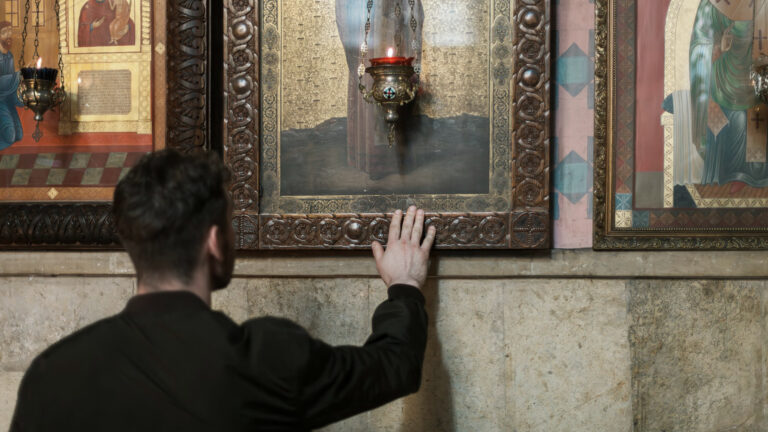I enjoy conversations with college and seminary students developing an intellectual life in service to the church, who envision a future in which the life of the mind is a central preoccupation. They look forward to years of voracious reading, following the trails of their curiosity, and engaging knowledgeably in discussions and debates over important ideas and practices.
Often, these students ask, Where do I start? They look to those of us who’ve been reading, writing, teaching, and preaching for a while now, and they ask, How do I get from here to there? Where do I begin?
I see in these questions a desire to offer something of value to the church. The students recognize the necessity of intellectual growth, and naturally, they wonder how to figure out what to study and where to begin. But these questions assume there’s a particular order of steps applicable for everyone, a well-worn path to follow if they could just find the entrance. And while there’s no denying the importance of reading foundational texts in the history of philosophy and theology if aspiring to the life of the mind, my counsel doesn’t start with the “classics” or the “essentials.”
My advice? Just jump in. Start in the middle. Because the middle is your beginning.
Enter the Ongoing Conversation
Starting down the road of intellectual inquiry and theological reflection is like entering a conversation that has been going on for a long time. As you listen to people well-versed in the terms and concepts of a theological discussion, you get the lay of the land. Over time, you discern the contours of the conversation more broadly, and you may even find a few places to dig deeper in your studies so you too can contribute.
But there’s no specific “beginning,” unless we’re talking more generally about the fear of the Lord. Just jump in. Tune in to the broadcast already “in progress.” Join a conversation already taking place and focus first on careful listening, with humility and curiosity.
Follow Trails
When I was a student at a Christian university in Eastern Europe, I had access to a terrific library of theological resources. Because of their value, most of the books were unavailable for checkout, so I spent hours in that library working through books that piqued my interest.
One of my earliest intellectual pursuits involved Jesus’s parables and they how functioned in their original context. I was fascinated by carefully comparing the different versions of the parables in the Synoptic Gospels, and I spent significant time with Kenneth Bailey’s Poet and Peasant and Through Peasant Eyes. Craig Blomberg’s Interpreting the Parables showed me the landscape of parabolic interpretation through the centuries. Following more trails, I was introduced to the important work of C. H. Dodd and the contribution of Joachim Jeremias. I followed a few trails into the dead-end skeptical takes of the Jesus Seminar and the landmark work of John Dominic Crossan’s In Parables.
Tracing my way back, I noticed how those trails led me into an even bigger conversation—“the quest for the historical Jesus.” Ben Witherington’s work gave me a lay of the land, and eventually, I arrived at N. T. Wright’s massive volume Jesus and the Victory of God, which I spent more than a month with, reading it cover to cover, absorbed by the brushstrokes of Wright’s historical portrait. Soon, I was following footnotes to other conversation partners, reading predecessors and successors in historical Jesus studies, reviewing older works of history and then engaging present-day scholars still responding to Wright’s work.
No, I never became a historical Jesus scholar (although I try to keep up with the latest scholarship on the Gospels). But I’ve wandered onto a bunch of other trails, driven by passion and curiosity and sometimes ministry necessity, all culminating in a PhD focused on North American missiology, with an emphasis more in systematic theology than biblical and theological studies.
My point is that I’ve had the pleasure of joining lots of conversations along the way—all of them in progress. I’ve engaged in ongoing discussions about the church’s posture toward the culture, the breadth of the church’s mission in the world, the relationship between eschatology and discipleship, and the philosophical and technological developments that have left our cultural landscape marked by expressive individualism, Enlightenment rationalism, and the scars of the sexual revolution.
I’m more of a generalist than a specialist. I’m wired that way. Other scholars have taken a different approach, following one trail deeper and deeper into the forest until they become experts who can make a strong contribution to a specialized field. There’s no right or wrong here. My point is this: When you’re at the outset of a theological journey, just jump in. Don’t expect to find the perfect spot to start from. Follow your curiosity until it leads you into the conversations that make your heart race and your brain hurt.
Guidance, Friendship, and the Point of Theology
Guidance matters. Find mentors who’ve spent significant time in the conversations that interest you, because they can help you read well and widely. They can keep you from the dead-ends and cul-de-sacs as they guide you into the field. They can help you avoid chronological snobbery or youthful enthusiasm that arrives at conclusions too quickly.
Friendship matters too. Find peers who share your curiosity. Cultivate a life with people whose work overlaps with yours but isn’t perfectly aligned, because they’ll broaden your perspective by refining your thinking. They’ll push back when you fail to reckon with the best critiques issued against your favorite authors. They’ll celebrate when you unearth something original you can contribute to the conversation.
Most importantly, remember that talk about God is just talk. The real goal of theological study is to grow in knowledge and love of God and then serve his people more faithfully. The intellectual life should never be separated from one’s devotional practices. A mind without devotion can turn brilliance into blindness.
So follow the trails and enjoy the campsites where fellow students gather around the fire and affirm and argue, discuss and debate, in pursuit of truth. Just remember to keep climbing, with your intellect bent toward your Maker and your world of thought infused by wonder, because the best trails lead up toward the summit, the mountaintop of praise and worship of the triune God.
If you would like my future articles sent to your email, as well as a curated list of books, podcasts, and helpful links I find online, enter your address.

















